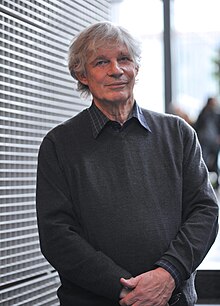Stuart Kauffman
| Stuart Kauffman | |
|---|---|

Stuart Kauffman in April 2010
|
|
| Born | September 28, 1939 |
| Institutions |
University of Chicago University of Pennsylvania University of Calgary |
| Alma mater |
Dartmouth College Oxford University University of California, San Francisco |
| Known for | NK model, origin of life, gene regulatory networks |
| Notable awards |
Wiener Medal (1969) Marshall Scholar MacArthur Fellow |
Stuart Alan Kauffman (born September 28, 1939) is an American medical doctor, theoretical biologist, and complex systems researcher who studies the origin of life on Earth.
In 1967 and 1969 Kauffman proposed applying models of random boolean networks to simplified genetic circuits. These were very early models of large genetic regulatory networks, proposing that cell types are dynamical attractors of such networks and that cell differentiation steps are transitions between attractors. Recent evidence strongly suggests that cell types in humans and other organisms are indeed attractors. In 1971 he suggested that the zygote may not access all the cell type attractors in the repertoire of the genetic network's dynamics, hence some of the unused cell types might be cancers. This suggested the possibility of "cancer differentiation therapy".
In 1971, Kauffman proposed the self-organized emergence of collectively of polymers, specifically peptides, for the origin of molecular reproduction. Reproducing peptide, DNA, and RNA collectively autocatalytic sets have now been made experimentally. He is best known for arguing that the complexity of biological systems and organisms might result as much from self-organization and far-from-equilibrium dynamics as from Darwinian natural selection as discussed in his book Origins of Order (1993). His hypotheses stating that cell types are attractors of such networks, and that genetic regulatory networks are "critical", have found experimental support. It now appears that the brain is also dynamically critical.
Kauffman graduated from Dartmouth in 1960, was awarded the BA (Hons) by Oxford University (where he was a Marshall Scholar) in 1963, and completed a medical degree (M.D.) at the University of California, San Francisco in 1968. After completing his internship, he moved into developmental genetics of the fruitfly, holding appointments first at the University of Chicago from 1969 to 1973, the National Cancer Institute from 1973 to 1975, and then at the University of Pennsylvania from 1975 to 1994, where he rose to Professor of Biochemistry and Biophysics.
...
Wikipedia
